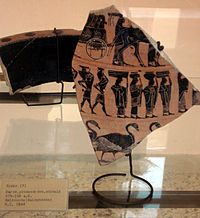- Disjecta membra
-
Disjecta membra is Latin for “scattered members” and is used to refer to surviving fragments of ancient pottery, manuscripts and other cultural objects, and even fragments of ancient poetry. It is derived from "disjecti membra poetae," referring to the limbs of a dismembered poet, a phrase used by the Roman author Horace.[1]
Contents
Pottery
Scholars have long referred to fragments of ancient Greek pottery as "disjecta membra." They have studied fragments of ancient Greek pottery in institutional collections, and have attributed many such pieces to the artists who made them. In a number of instances they have been able to identify fragments now in different collections that belong to the same vase.[2]
Poetry and writings
Fragments of ancient writing, especially ancient Latin poetry found in other works are commonly referred to as disjecta membra.[3]
Ancient and medieval manuscripts
Isolated leaves or parts of leaves of ancient or medieval manuscripts are also called disjecta membra. Scholars have been able to identify fragments now held in different libraries that originally belonged to the same manuscript.
References
- ^ Oxford English Dictionary
- ^ Aaron J. Paul, "Fragments of Antiquity: Drawing Upon Greek Vases," Harvard University Art Museums Bulletin, Vol. V, No. 2 (Spring 1997), pp.. 4, 10.
- ^ Dictionary.com
Categories:- Latin words and phrases
- Poetry
- Archaeology
- Medieval manuscripts
Wikimedia Foundation. 2010.

